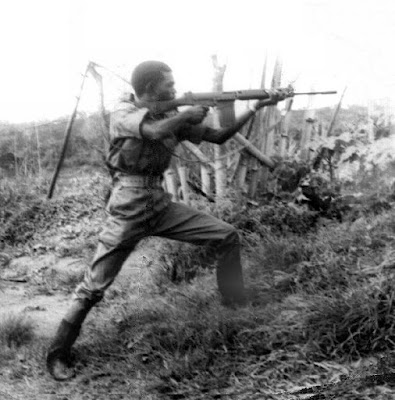BIAFRA: The Fall of Aba
Time Friday, September 13, 1968
Like most other stages of the Nigerian civil war, the federal forces' much heralded "final offensive" against the breakaway territory of Biafra has proceeded more slowly and tortuously than scheduled. Despite the superiority in numbers and firepower of the advancing Nigerian armies, Lieut. Colonel Chukwuemeka Odumegwu Ojukwu's Biafran army has replied to every federal gain with commando raids, often forcing the Nigerians to move half a step backward for each one forward. But last week, after holding out for twelve days against withering artillery fire, the Biafrans were driven out of Aba, their administrative capital and largest remaining city. Together with other losses, the fall of Aba reduced Biafra's territory to approximately 5,000 square miles, or one-sixth of the secessionist state's original size.
Reinforced Belief. The city's 100,000 residents fled in terror when federal troops started shelling the capital from all sides. They were running not only from the artillery. Commandos who came back from behind enemy lines reported that Nigerian troops had brutally slaughtered whole villages in their advance. South of Aba, village streets were strewn with the bodies of women, children and men whose hands were bound before automatic gunfire ripped through their chests. As reports of the butchery spread, Biafrans became more grimly convinced than ever that they have no chance of surviving a surrender. More than 5,000,000 of them have already decided to flee their homes rather than risk staying in them behind federal lines, creating what Swiss Relief Coordinator August Lindt has called the worst refugee problem of the century.
With the end of seasonal rains, relief organizations were able to step up night flights to the Biafran airstrip Annabelle, located on a widened piece of blacktop highway near Nnewi. Up to 15 planes a night winged in carrying dried fish, milk, meat and other protein food. But at best the hazardous airlift can provide only 1,000 tons of food a week, which is about what is estimated to be needed daily by the starving people of Biafra. Hope flickered that massive relief might get under way when the Nigerian commander, Major General Yakubu Gowon, agreed to permit daylight food flights to Annabelle for ten days without firing on them. At week's end, the flights had still not begun because of Biafra's insistence that authorized flights land at Obilago airstrip in central Biafra. Nigeria refused to authorize landings there, claiming that they would interfere with the federal march on Umuahia, Ojukwu's military headquarters.
Like most other stages of the Nigerian civil war, the federal forces' much heralded "final offensive" against the breakaway territory of Biafra has proceeded more slowly and tortuously than scheduled. Despite the superiority in numbers and firepower of the advancing Nigerian armies, Lieut. Colonel Chukwuemeka Odumegwu Ojukwu's Biafran army has replied to every federal gain with commando raids, often forcing the Nigerians to move half a step backward for each one forward. But last week, after holding out for twelve days against withering artillery fire, the Biafrans were driven out of Aba, their administrative capital and largest remaining city. Together with other losses, the fall of Aba reduced Biafra's territory to approximately 5,000 square miles, or one-sixth of the secessionist state's original size.
Reinforced Belief. The city's 100,000 residents fled in terror when federal troops started shelling the capital from all sides. They were running not only from the artillery. Commandos who came back from behind enemy lines reported that Nigerian troops had brutally slaughtered whole villages in their advance. South of Aba, village streets were strewn with the bodies of women, children and men whose hands were bound before automatic gunfire ripped through their chests. As reports of the butchery spread, Biafrans became more grimly convinced than ever that they have no chance of surviving a surrender. More than 5,000,000 of them have already decided to flee their homes rather than risk staying in them behind federal lines, creating what Swiss Relief Coordinator August Lindt has called the worst refugee problem of the century.
With the end of seasonal rains, relief organizations were able to step up night flights to the Biafran airstrip Annabelle, located on a widened piece of blacktop highway near Nnewi. Up to 15 planes a night winged in carrying dried fish, milk, meat and other protein food. But at best the hazardous airlift can provide only 1,000 tons of food a week, which is about what is estimated to be needed daily by the starving people of Biafra. Hope flickered that massive relief might get under way when the Nigerian commander, Major General Yakubu Gowon, agreed to permit daylight food flights to Annabelle for ten days without firing on them. At week's end, the flights had still not begun because of Biafra's insistence that authorized flights land at Obilago airstrip in central Biafra. Nigeria refused to authorize landings there, claiming that they would interfere with the federal march on Umuahia, Ojukwu's military headquarters.


Comments